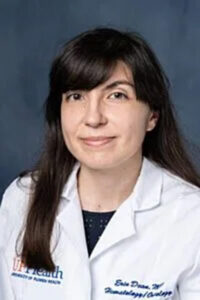Past Funding Successes
What We Have Funded
The Ocala Royal Dames for Cancer Research, Inc. began its fight against cancer over 30 years ago. Since then, we have provided seed money for carefully screened and promising research projects. Annually the organization provides at least $100,000 in grants per year for Cancer Research.
We HAVE made a difference! ORD funds research in the state of Florida that has had a global influence. We are honored to have provided preliminary funding for:
Keytruda: the first line treatment for advanced Melanoma, as well as the treatment of Non-Small Cell Lung Cancer, classical Hodgkin Lymphoma and a type of Bladder and Urinary Tract Cancer. Seed money provided to Dr. Shari Pilon-Thomas contributed to the development of Keytruda. The drug is not chemotherapy or radiation therapy—it is an immunotherapy that works with the immune system to help fight cancer.
Proton Therapy: an effective alternative to traditional radiation that targets tumors and cancer cells more precisely than conventional radiation. Proton radiation reaches only the areas of the body that are affected by cancer. This leads to less risk that healthy tissue will be exposed to radiation – and reduces the risk of complications and side effects. Fewer treatment complications mean that physicians can deliver higher doses of proton radiation to cancer sites, thereby improving the chances for a successful outcome. Proton Therapy is now used to treat breast, lung, testicular, prostate, brain and many other cancers.
Pediatric Oncologist, Dr. Elias Sayour, have received a $2.5 million grant from the pediatric cancer foundation, CureSearch for Children’s Cancer. This will provide funding for the first in-human clinical trial to test a novel form of immunotherapy to treat the most aggressive forms of malignant brain tumors. The Ocala Royal Dames for cancer Research, Inc. Provided seed money for his project, RNA nanoparticle vaccines targeting malignant canine gliomas from 2016-2018.
Dr. Heiko Enderling has recently received $275, 000 from the National Institute of Health to further his research on “Personalizing adaptive therapy for prostate cancer.”
Dr. Heiko Enderling has recently received $275, 000 from the National Institute of Health to further his research on “Personalizing adaptive therapy for prostate cancer.”
In addition, the College of Central Florida administers the Ocala Royal Dames for Cancer Research Endowed Scholarship:
• Fund balance as of 5/28/2020 was $70,325.85.
• Total Scholarships awarded Academic year 2002-2003 through academic year 2018-2019 $22,900.03
• Scholarship funds allocated for 2019-2020 $2,200
Ocala Royal Dames Endowment for Cancer-Related Educational Resources Endowed Chair:
• Fund balance as of 5-28-2020: $137,731.13
• Total funds endowed in chair awards to date: $47,947.87
2023 Projects
Erin Dean, MD
Title of project:
Evaluating soluble B-cell maturation antigen as a new serum marker of minimal residual disease in patients with Multiple Myeloma
Description of project:
Multiple Myeloma (MM) is an incurable hematologic malignancy, originating in the plasma cells (a type of white blood cell) in the bone marrow, which affects patients at an average age of 70. Initial treatment involves induction therapy typically followed by autologous hematopoietic stem cell transplantation (HSCT) for consolidation of the initial response. Achieving and maintaining undetectable minimal residual disease (MRD) in the bone marrow with therapy has been associated with prolonged progression free survival and overall survival. While approved MRD testing exists to detect persistent disease and early relapse in the bone marrow, this requires repeated bone marrow biopsies (BMBx) to obtain bone marrow aspirate samples. This is costly, painful, and inconvenient to the patient; thus, this is impractical and not usually done in clinical practice. There are currently no reliable assays able to identify concomitant MRD disease in the peripheral blood. This project will address a critical unmet need and generate a practical, non-invasive way to assess how well the patient is responding to therapy and provide an early warning signal for progression of disease so treatment can be started on time to improve patient outcomes.
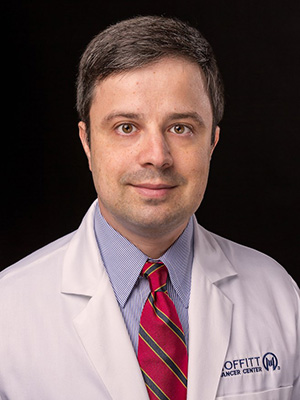 Joseph Markowitz, MD, PhD
Joseph Markowitz, MD, PhD
Title of project:
Nitric oxide dependent response to adjuvant interferon therapy in melanoma.
Description of project:
In 2022 there are projected to be 99,789 diagnosed melanoma cases and 7,650 deaths. Most patients present with melanoma that can be surgically resected. However, many patients relapse and therefore systemic therapy after surgery was developed to prevent distant metastatic disease. The first FDA approved therapy after surgery (adjuvant therapy) was interferon α albeit at a high risk of toxicity. In the 2010s, antibodies were developed and approved for clinical use that target checkpoint molecules that function to inhibit the immune response to melanoma. The first antibody was ipilimumab which blocks the CTLA-4 receptor on a subset of immune cells called T cells. Pembrolizumab and Nivolumab followed which block another inhibitory receptor on T cells called PD-1. The antibodies increase relapse free survival after surgery. The anti-PD-1 antibodies have a slight advantage of relapse free survival and a significant advantage with regards to overall toxicity. However, many patients treated with adjuvant anti-PD-1 antibodies relapse with distant metastatic disease. Given the different mechanism of actions it is very likely that subgroups of patients that will respond to interferon α or anti-CTLA- 4 therapy that will not benefit from anti-PD-1 therapy. Recently, our group has published an immune cell signature including the levels of nitric oxide that predicts response to ipilimumab (anti-CTLA-4) therapy among melanoma patients undergoing adjuvant therapy after resection using a novel immune phenotyping tool. We also have access to the peripheral blood samples and the mRNA array data collected from FFPE tissue specimens from the eastern cooperative oncology group (ECOG) clinical trial – ECOG 1609 where adjuvant ipilimumab was compared to interferon α. In addition, we are collecting samples from anti-PD-1 in the adjuvant setting.
This pilot grant will apply our novel tool (MPATR) to test whether the nitric oxide immune signature in the peripheral blood samples collected from patients receiving interferon α in ECOG 1609 predicts for longer relapse free survival (RFS). We hypothesize that increases in nitric oxide in immune effector cells and decreased nitric oxide levels in immune suppressor cells are associated with defined transcriptomic/proteomic signatures and increased relapse free survival to interferon therapy. Future directions will compare the results for a parallel study for the anti-CTLA-4 cohort of the clinical trial and an internally collected anti-PD-1 cohort (funded separately). The goal of this line of work is to determine which patients will respond the best to which line of adjuvant therapy as there are clearly patients who benefit from each line of therapy. We are choosing therapy based on a small response rate effect in the general population and an improved toxicity profile. In addition, we will gain valuable information on the interferon and nitric oxide dependent mechanisms of resistance to anti-PD-1 therapy that can be utilized for future therapeutic development in melanoma.
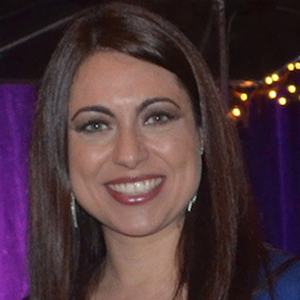 Marilena Tauro, PhD
Marilena Tauro, PhD
Title of project:
A novel autophagy protein to guide Triple Negative Breast Cancer (TNBC) treatment response
Description of project:
TNBC is an aggressive and incurable disease (1). Despite the initial response to chemotherapy (2), patients often relapse with resistant disease that has spread to other parts of the body (3). Our group has found that TNBC cells use a program known as autophagy (self-eating) to protect themselves against chemotherapy induced cell deaths (4) In our preliminary studies, we have found that a novel protein that regulates the autophagy pathway can be a good indicator of whether patients will progress rapidly to develop resistant disease. The overall goal of this proposal is to fully investigate whether the detection of a novel biomarker of autophagy known as ULK3 in TNBC biopsies can guide clinical decisions of treatment, improve risk stratification and tailor treatment intensity in patients. To this end we plan to test the levels of ULK3 at diagnosis in tissue biopsies and monitor their response to treatment.
The rationale for this project is built on our preclinical studies on TNBC patient biopsies commercially available (US Biomax, Inc), where tissue was probed for a variety of proteins important in activating alternative nutrition of cancer cells, such as autophagy during treatment. We discovered, for the first time, that ULK3 protein increases with the progressive stage of the disease and in response to certain pro-apoptotic treatments (6). These preliminary data support our hypothesis that the increased presence of this protein correlates with poorer overall survival of the patient. Our preliminary data focused mainly on Non-Hispanic White patients but in the current proposal we will have any opportunity to determine whether our hypotheses hold true for Hispanic patients which are a major underserved population in Moffitt’s catchment area.
We believe that results generated via this research will yield a powerful clinical tool for patient prognosis and in the treatment-decision making process (for example, radiation vs chemotherapy). Stratification of TNBC may also improve quality of life for the patient by not exposing them to “one size fits all” chemotherapy that can cause serious side-effects and ultimately may prove ineffective for their disease.
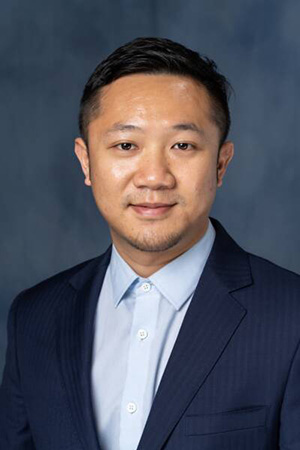 Fan Zhang
Fan Zhang
Title of project:
In situ program CAR-Macrophage against glioblastoma
Description of project:
Malignant gliomas are the most common and aggressive form of primary brain tumors. Although cancer immunotherapies have achieved tremendous progress in other cancer types, they have not been beneficial to glioma patients. A major obstacle for successful immunotherapy for glioma is the hostile immune-suppressed tumor microenvironment (TME) that limits treatment efficacy. Tumor-associated monocytes/macrophages (TAMs) are major component of TME. They are constantly being recruited to tumor in large numbers, where they help tumor to grow and spread. Current strategies to targeting TAMs for cancer treatment are inefficient, toxic, and are non-specific. To address these limitations, we propose a novel strategy by developing a ‘mRNA nanotherapeutics’ – a therapeutic platform being used in the COVID-19 vaccine, to reprogram tumor-promoting TAMs to recognize and actively clear glioma cells. If implemented into the clinic, this ‘off-the-shelf therapy’ would enable physicians to quickly re-activate immunity against tumors while avoiding toxic side effects. It also has the potential to abrogate the tumor resistance to current standard-of-care treatment.
 About Jameel Muzaffar, MD
About Jameel Muzaffar, MD
Title of project:
Gut microbiome/ metabolome as a predictor and modulator of response to immunotherapy in head and neck cancer.
Description of project:
Head and neck squamous cell cancer (HNSCC) represents an array of clinically heterogeneous cancers which have a high unmet need for effective treatment options1. Immunotherapy in the form of Immune checkpoint blocker(ICB) has revolutionized the treatment of many advanced cancers including head and neck cancers1. Overall survival in patients who respond to immunotherapy has increased remarkably compared to chemotherapeutic options. However, response rates to immunotherapy in HNSCC is 20% at best2. Hence there is an urgent need to investigate markers of response and evaluate strategies to improve response among these patients to improve their survival.
Accumulating evidence from various studies ,mostly in melanoma patients, support that the gut microbiome can predict and modulate immunotherapy responses, however these studies have yielded widely conflicting results in respect to microbiome signatures and diversity that correlate with response3,4, thus limiting any clinical applicability. To overcome this limitation and to generate better understanding of dynamic relationship between the gut microbiome and immunotherapy, we need to characterize longitudinal changes in gut microbiota and microbial metabolites and its association with antitumor ICB responses in HNSCC patients.
We propose the first pilot study to evaluate longitudinal changes in gut microbiome and metabolome in HNSCC patients treated with ICB to develop a predictive biomarker of response to immunotherapy. Further, we propose preclinical fecal microbiota transplant studies to elucidate gut microbiota mediated modulation of antitumor responses and generate mechanistic data underlying the antitumor immune modulation. Understanding of mechanistic pathway would lead to develop strategies to modulate the gut microbiome to improve treatment outcome of hundreds of thousands of patients with head and neck cancer.
2022 Projects

Dr. Alexandra Martin
Dr. Martin is a Cancer Researcher in the Clinical Science Department at Moffitt Cancer Center. She is investigating an innovative way of dosing PARP inhibitors, a common therapy for ovarian cancer in both treatment and maintenance settings. Rather than standard dosing, she uses adaptive therapy based on mathematical models and evolutionary principles to guide drug dosing and on-off cycling, with the goal of maintaining a stable tumor burden by allowing a population of treatment-sensitive cells to survive. Her work seeks to identify suitable biomarkers to further refine mathematical models for use in ovarian cancer patients to delay or prevent drug resistance and disease progression, decrease cumulative drug use, decrease toxicities, increase quality of life and save healthcare dollars.
2020/2022 Martin Research Project:
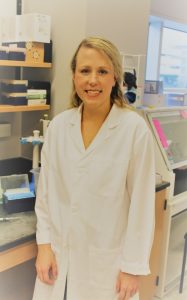 Optimization of poly ADP ribose polymerase (PARP) inhibitor dosing for ovarian, fallopian tube and primary peritoneal carcinoma using adaptive therapy
Optimization of poly ADP ribose polymerase (PARP) inhibitor dosing for ovarian, fallopian tube and primary peritoneal carcinoma using adaptive therapy
Despite many new developments in treatment, ovarian cancer remains a leading cause of death in women. Approximately 70% of ovarian cancer patients will experience recurrence of disease. This project will use retrospective data and mouse models to optimize mathematical models and determine the optimal dosing of PARP inhibitors for ovarian cancer patients based on changes in their tumor and bloodwork. The mathematical models will be used to run a clinical trial comparing standard dosing to adaptive therapy, with the goals of preventing or delaying drug resistance and disease recurrence, improving treatment-related toxicities and decreasing overall healthcare costs.
 Dr. Heiko Enderling
Dr. Heiko Enderling
Dr. Heiko Enderling is an Associate Member in the Integrated Mathematical Oncology Department at Moffitt Cancer Center. His research integrates mathematical, biological, and clinical sciences to model, simulate, and predict treatment response for individual patients. Models are created based on experimental data and historic clinical outcome data to develop, calibrate and validate the mathematical models of a certain disease and a certain treatment response. Once researchers have a model that is performing well, they integrate patient-specific data which is used to predict responses to treatments for individual patients on the computer or to run broader computerized clinical trials to find the best treatment. Dr. Heiko Enderling was recently named Fellow and elected President-elect of the Society for Mathematical Biology.
2020/2022 Enderling Research Project:
 Simulating the effect of photoimmunotherapy on the ovarian cancer immune ecosystem
Simulating the effect of photoimmunotherapy on the ovarian cancer immune ecosystem
Despite advances in surgery and therapeutics, the survival of advanced or recurrent epithelial
ovarian cancer (EOC) remains dismal due in part to the complex tumor-immune microenvironment. This project will develop a computer model that simulates the effectiveness of using chemotherapy and immunotherapy in the treatment of epithelial ovarian cancer (EOC). The model can be adapted to develop, calibrate, and validate changes during photoimmunotherapy, and to identify optimal photoimmunotherapy dosage needed to stimulate anti-tumor immunity to target cells which can lead to metastatic disease.
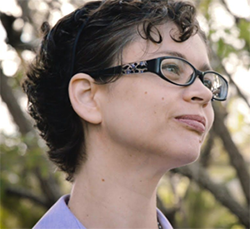 Olga Guryanova, MD, PhD
Olga Guryanova, MD, PhD
Assistant Professor, UF College of Medicine
Department of Pharmacology & Therapeutics
The overarching research goal of the Guryanova Lab is to delineate the mechanisms of the cross-talk between epigenetics and chromatin organization, learning how these processes apply to the development of acute myeloid leukemia (AML), resistance to therapies, and clonal evolution. Ultimately, Dr. Guryanova would like to harness this mechanistic understanding to develop improved therapeutic approaches for leukemia.
 2020: Novel combinatorial treatment approaches to augment sensitivity to cytarabine in acute myeloid leukemia with DNMT3A mutations
2020: Novel combinatorial treatment approaches to augment sensitivity to cytarabine in acute myeloid leukemia with DNMT3A mutations
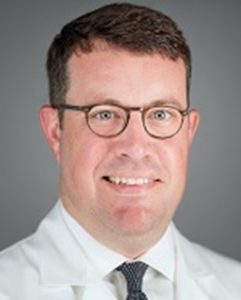 Dr. John Mullinax
Dr. John Mullinax
Dr. John Mullinax is a surgical oncologist in the Sarcoma Department at Moffitt Cancer Center. His clinical practice focuses on caring for patients with soft tissue sarcoma located throughout the body, with a specific focus on retroperitoneal sarcoma, gastrointestinal stromal tumor (GIST), and adrenal neoplasms. A native Floridian, Dr. Mullinax completed his general surgery training at the University of South Florida. During this training he spent two years focused on laboratory research, completing a fellowship in the Surgery Branch at the National Cancer Institute in Bethesda, MD. After completion of his research fellowship he returned to Tampa where he completed his general surgery training, serving as the administrative Chief Resident during the final year. During general surgery training he was chosen as the Tampa Bay Surgical Society outstanding resident, and Resident of the Year twice. He then completed a Complex General Surgical Oncology fellowship at Moffitt Cancer Center prior to joining the faculty. As a fellow, he won the American College of Surgeons Commission on Cancer paper competition. He is currently an Active Member in the Association for Academic Surgery and Society of Surgical Oncology. He is on the Executive Board and serves on the Commission on Cancer committee for the Florida Chapter of the American College of Surgeons.
2020/2022 Mullinax Research Project:
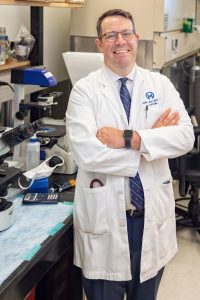 Development of Expanded Access Criteria for Adoptive Cell Therapy in Soft Tissue Sarcoma
Development of Expanded Access Criteria for Adoptive Cell Therapy in Soft Tissue Sarcoma
Patients with advanced sarcoma have limited therapeutic options and the chemotherapy options that exist do not offer durable long-term survival. Immunotherapy, specifically adoptive cell therapy (ACT) using tumor infiltrating lymphocytes (TIL), offers a new therapeutic option for these patients. This project will build on our clinical trial experience with adolescent and young adult (AYA) sarcoma patients. We will resect a tumor from patients, grow the white blood cells from that tumor in a laboratory and then give them back to the patient after they multiply many times. This method essentially replaces the patient’s immune system with their own cells which are capable of killing the tumor. We are currently treating sarcoma patients using this method and we now seek to optimize our methods using several different approaches.
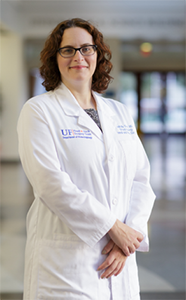 Natalie Silver, MD
Natalie Silver, MD
Assistant Professor, UF College of Medicine
Department of Otolaryngology
Researchers at the University of Florida College of Medicine Department of Otolaryngology examined the anti-tumor activity of tumor-derived RNA nanoparticles in an oral cavity squamous cell carcinoma murine model. The research was conducted in collaboration with Elias Sayour, M.D, Ph.D., in the UF Brain Tumor Immunotherapy Program. The results were presented at the American Association for Cancer Research meeting in November 2018.
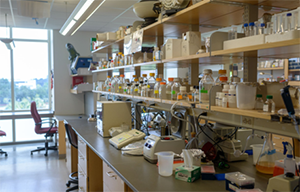 According to Natalie Silver, M.D., M.S., an assistant professor in the division of head and neck oncologic surgery in the Department of Otolaryngology at the university and one of the investigators for this project, UF is one of the few institutions in the world that has developed clinically translatable nanoparticles that can be loaded with RNAs encoding for tumor neoantigens. This is the first step in generating personalized cancer vaccines
According to Natalie Silver, M.D., M.S., an assistant professor in the division of head and neck oncologic surgery in the Department of Otolaryngology at the university and one of the investigators for this project, UF is one of the few institutions in the world that has developed clinically translatable nanoparticles that can be loaded with RNAs encoding for tumor neoantigens. This is the first step in generating personalized cancer vaccines
2020: “Translating Personalized RNA Nanoparticle Vaccines for Oral Cancer”
2021 Projects
 Mansour Mohamadzadeh, PhD
Mansour Mohamadzadeh, PhD
Professor, UF Colleges of Medicine and Veterinary Medicine
Department of Infectious Diseases & Immunology
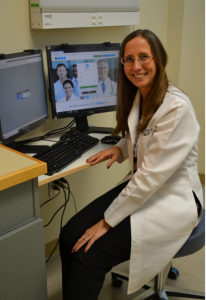 Julie Bradley, MD
Julie Bradley, MD
Assistant Professor, UF College of Medicine
Department of Radiation Oncology
UF Health Proton Therapy Institute
2015: Prospective Pilot Study of Early Markers of Radiation Induced Cardiac Injury in Patients with Left Sided Breast Cancer
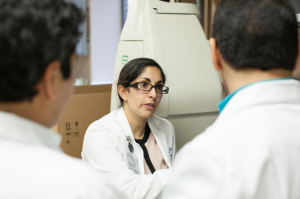 Maryam Rahman, MD
Maryam Rahman, MD
Assistant Professor, UF College of Medicine
Department of Neurological Surgery
2016: Using SR233 for Enhancing Cellular Migration in Dendritic Cell Vaccine Therapy for Malignant Brain Tumors

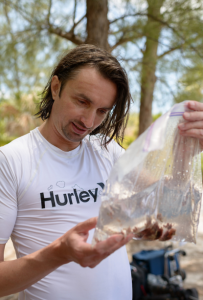 Hendrik Luesch, PhD
Hendrik Luesch, PhD
Professor And Chair, Debbie And Sylvia DeSantis Chair In Natural Products Drug Discovery And Development
UF College of Pharmacy
Department of Medicinal Chemistry
2016: Targeting Colon Cancer with a Novel Marine-Derived Selective Anticancer Agent
 Dr. William Slayton
Dr. William Slayton
Assistant Professor, UF College of Medicine
Department of Pediatrics
2008: Optimizing Targeted Therapy for PH+ Acute Lymphoblastic Leukemia
 Walter O’Dell, PhD
Walter O’Dell, PhD
Assistant Professor, UF College of Medicine
Department of Radiation Oncology
2013: Surveillance Imaging Trial for Stage II & IV Breast Cancer Patients
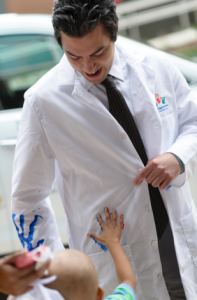 Elias Sayour, MD, PhD
Elias Sayour, MD, PhD
Assistant Professor, UF College of Medicine
Department of Neurological Surgery
 Nancy Mendenhall, MD
Nancy Mendenhall, MD
FASTRO
Professor, UF College of Medicine
Department of Radiation Oncology
Medical Director
UF Health Proton Therapy Institute

